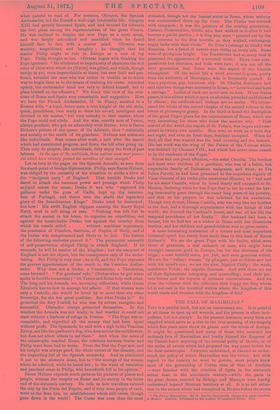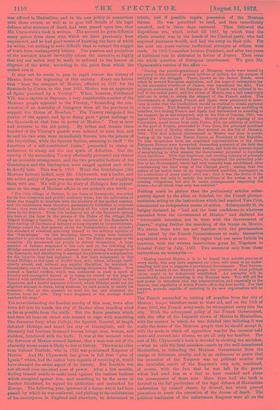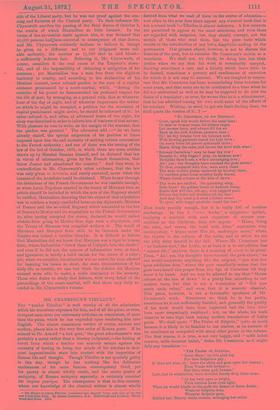THE FALL OF MAXLMILIAN.* Tars is a painful book, but
not an unnecessary one. It is painful at all times to open up old wounds, and the process is often inex- pedient, but not always. In the present instance, many facts are supplied which serve as a clue to the true meaning of the tragedy which five years since threw its gloom over the whole of Europe. itmight be questioned how many of those who mourned the untimely fate of Maximilian and loudly blamed the Emperor of the French knew anything of the internal policy of Mexico, or of the series of events which had prepared the way years before for the final catastrophe. Everyone understood, or fancied he under- stood, the policy of which Maximilian was the victim ; but with regard to the country he went to govern, most people knew more of the generalship of Cortes than of that of Iturbide —were familiar with the cruelties of Spain in the sixteenth rather than in the nineteenth century—while the parts in the great drama enacted by Hidalgo and Marzque were hardly understood beyond Mexican territory at all. It is to call atten- tion to the events which had transpired in Mexico before its crown
• TM Fall 0/ Maximilian. By W. Harrill Chynoweth, twenty-five years reatdent in Mexico. London: Published by the Author, 89 Lombard Ctreel. 1872. was offered to Maximilian, and to his own policy in connection with those events, as well as to give full details of his legal defence after sentence of death had been passed upon him, that Mr. Chynoweth's book is written. 'Ehe account he gives differs in many points from those with which we have previously been acquainted, and he had good means of knowing the facts of which he writes, but nothing is more difficult than to extract the nugget .of truth from contemporary history. The passions and prejudices of the narrator alrwst inevitably colour the narrative so highly that any one action may be made to redound to the honour or disgrace of the actor, according to the point from which the author sees it.
It may not be amiss to pass in rapid review the history of Mexico from the beginning of this century. Every one knows that "from the conquest of Mexico, effected in 1521 for the Spaniards by Cortes, to the year 1821, Mexico was an appanage of Spain governed by a Viceroy." When, however, Ferdinand VII. was a captive at Bayonne, a very considerable number of the Mexican people appealed to the Viceroy, "demanding the con- vocation of an Assembly of Delegates from all the provinces to support the House of Bourbon." The Viceroy recognised the justice of the appeal, and by so doing gave "great umbrage to the Spaniards at that time in power in Mexico." They at once had recourse to the old policy. By bribes and threats three hundred of the Viceroy's guards were induced to seize him, and he and his two sons were immediately thrown into the prisons of the Inquisition, while the Spanish faction, assuming to itself "the functions of a self-constituted Junta," proceeded to stamp or endeavour to stamp out the last spark of defection. But the cruelty of the succeeding Viceroy effectually prevented any chance of an amicable arrangement, and the two powerful factions of the Guadalupes and the Gachupines were ranged against each other in deadly hate. This was in 1810. What the Guadalupes (the Mexican faction) lacked, says Mr. Chynoweth, was a leader, and the selfish policy of Spain was soon the indirect means of supplying them with one. We will give the story of Hidalgo's first appear- ance on the stage of Mexican affairs in our author's own words :—
" The little village of Dolores, in the State of Guanajuato, was noted for ite fine vineyards and prolific mulberry trees ; but the cultivation of these was thought to interfere with the products of the mother country, and the inhabitants were therefore peremptorily forbidden to cultivate them ; they were also compelled to destroy all the vines and mulberry trees in the district. From this barbarous act of the Spaniards sprang the hero of the hour in the person of the Padre of the village, Don Miguel Hidalgo y Castilla. Stung by the injustice of the Spaniards in thus cutting off the fruits of industry so long enjoyed by his parishioners, lifidalgo raised the first general shout for Independence, and unfurled the standard of rebellion, attaching himself to the military captains of the 'Guadalupe'.' On this becoming known, troops were instantly marched to pat down the insurrection ; but the Padre was equal to the occasion. He summoned the people to defend themselves. A large number of Indians responded to the call, and on the following day Hidalgo surprised and took two adjacent towns, seizing the property of the Spaniards, and distributing it amongst his soldiers as a compensation for the injuries they had sustained. A few days subsequent to this found Hidalgo at the head of 40,000 men, with whom, although ineffi- ciently armed, and without any regular discipline, he marched on 'Guanajuato, one of the richest silver-mining districts in Mexico. Now ensued a fearful conflict, which was conducted in such a spirit of ferocity and revengeful hatred as to stamp its record on the page of history with indelible characters. The insurgents rushed wildly on the Spaniards, and a fearful massacre followed, which Hidalgo made not the slightest attempt to cheek, being desirous, by such scenes, to terrify his enemies. But on this occasion he went too far, and alienated the Creoles from his side. They were disgusted at the carnage which marked his steps."
Yet notwithstanding the fiendish cruelty of this man, town after town fell into his hands, the city of Mexico alone standing aloof as far as possible from the strife. But the fierce passions which had been let loose on either side seemed to rage with something like demoniac fury, when Calleja, the Spanish General, at length defeated Hidalgo, and seized the city of Guanajuato, and de- liberately had fourteen thousand human beings, men, women, and children, butchered with the knife. It was at the moment when the fortunes of Mexico seemed darkest, that a man rose out of the -obscurity whose name is likely to live in history. This was no other than Colonel Iturbide, who in 1822 was proclaimed Emperor of Mexico. And Mr. Chynoweth has given in full that "plan of Ignala" which, had the nation been capable of receiving it, would have changed the entire aspect of its history. But Iturbide was not allowed even one short year of power. After a few months, finding himself unable to make head against the restless factions which conspired against him, and unwilling to be the cause of further bloodshed, he signed his abdication and embarked for Europe. The following year, ignorant of a decree which had been passed by which he was outlawed, and yielding to the solicitations of his countrymen in England and elsewhere, he determined to return, and if possible regain possession of the Mexican throne. He was permitted to land, and then immediately arrested, and in three days executed. Then followed the Republican era, which lasted till 1847, by which time the whole country was in the hands of the Clerical party, who had acquired enormous wealth, and had the army on their side. For the next ten years various ineffectual attempts at reform were made. In 1855 Comonfort became President, and after two yews of turbulent rule he abdicated in favour of Juarez. Then came the whole question of European interference. We give Mr. Chynoweth's version of the affair :-
"During the pseudo-presidency of Miramon, bonds were issued by his party to the extent of several millions of dollars, for the purpose of carrying on the struggle. These, known as the Jecker Bonds, were taken by several European capitalists, and the hope of redemption lay in the successful overthrow of Juarez, who repudiated the debt. The religions enthusiasm of the Empress of the French was enlisted in be- half of the exiled party, and the riches of Mexico was a bait temptingly held out in order to obtain the support of the French nation. The Governments of England, France, and Spain were petitioned to inter- vene in order that the bondholders should be enabled to obtain payment of their claims. Earl Russell, on the part of England, was unwilling to interfere, but finding France and Spain had determined on acceding to the request, he at last consented, and on the 31st of October, 1861, was signed the 'Convention of London.' Shortly- after the signing of the Convention' naval forces from each Power, with the addition of military on the part of France, proceeded to Vera Cruz, the principal maritime town and port of Mexico, where they arrived on the 7th of January, 1862. The first Liberal Government in Mexico was then in power, having at its head Don Benito Juarez, as President of the Republic. To him despatches from the combined representatives of the three European Powers were forwarded, demanding payment of the debt due to them respectively by the Mexican nation, and with the avowed object of ascertaining in what manner the Government purposed to liquidate those liabilities. With that frankness and sterling honesty of principle which characterises President Juarez, he explained the pecuniary post- tion of his Government, which had very recently been established, after overthrowing the fatal sway of the Clerical party ; stating that the coffers of the nation were in an impoverished condition, consequent on the contentions of many years' civil war ; that it was the desire of the Government not only to satisfy the creditors of the nation as to all existing obligations, but also to make arrangements respecting the future—for all which time only was solicited."
Nothing could be plainer than the preliminary articles subse- quently signed by the allies at Soledad, but the French plenipo- tentiaries, acting on the instructions which had reached Vera Cruz, commenced an independent course of action. Subsequently M. de Saligny declared he "had not the least confidence in whatever emanated from the Government of Mexico," and declared his "irrevocable intention not to treat with the Government of Juarez," urging further the marching of the troops on Mexico. We advise those who are not familiar with the proclamation then issued by the French Commissioners to make themselves acquainted with it at once. We regret that our space forbids its insertion, with the written instructions given by Napoleon to General Forey in July, 1862. Two sentences only from those instructions we transcribe :- "Having reached Mexico, it is to be hoped that notable persons of every shade, who may have espoused our cause, will come to an under- standing with you to organise a provisional Government. That Govern- ment will submit to the Mexican people the question of what political regime ought to be definitively established. An assembly will be immediately elected according to the Mexican laws. You will aid the new power to introduce into the administration, and especially in the ffnance, that regularity of which France offers the best model. For that purpose, persons capable of assisting in its new organisation will be
sent."
The French succeeded in cutting off supplies from the city of Mexico ; hunger therefore came to their aid, and on the 10th of June, 1863, the French army made its triumphant entry into the city. With the subsequent policy of the French Government, with the offer of the Imperial crown of Mexico to Maximilian, with the manner in which he was deluded into believing it was really the desire of the Mexican people that he should accept it, with the mode in which all opposition was for the moment held down and coerced into silence, we are all only too familiar. The rest of Mr. Chynoweth's book is devoted to showing the mistakes, —what he calls the fatal mistakes—made by the well-intentioned Maximilian, in defending the Mexican Government from the charge of deliberate cruelty, and in an endeavour to prove that the execution of the Emperor was no political murder but the inevitable result of the Emperor's own acts, combined, of course, with the fact that he was left by the power which had used him as a tool to bear unaided and alone the consequence of those acts. More than half the book is devoted to the full particulars of the legal defence of Maximilian undertaken by counsel chosen by himself, but which proved powerless to avert the execution of the decree of death. The political tendencies of the unfortunate Emperor were all on the
side of the Liberal party, but he was not proof against the cun- ning and flatteries of the Clerical party. To their influence Mr. Chynoweth ascribes the passing of the .fatal decree of October 3, the results of which Maximilian so little foresaw. In the terms of the accusation made against him, it was declared that 40,000 persons had:been executed in consequence of that decree, and Mr. Chynoweth evidently inclines to believe it, though he gives, on a different and to our judgment more reli- able authority, the number as 11,000 shot in cold blood— a sufficiently hideous fact. Believing it, Mr. Chynoweth, of course, considers it the real cause of the Emperor's down- fall, and of the impossibility of obtaining a mitigation of his
.• sentence ; yet Maximilian was a man free from the slightest tendency to cruelty, and according to the declaration of his Mexican counsel, never refused pardon in the case of a capital sentence pronounced by a court-martial, while, "during the exercise of his power he demonstrated his profound respect for the life of man, by arranging, as a general rule, that at whatever hour of the day or night, and of whatever importance the matter on which he might be occupied, a petition for the remission of capital punishment might arrive, he should be informed of it ; he never refused it, and often, at advanced hours of the night, his sleep was disturbed in order to inform him of business of that nature. With pleasure he rose to write, on the margin of the warrant, that the pardon was granted." The advocates add :—" As we have already stated, the special exigencies of his position at times imposed upon him the sad necessity of making certain concessions to the French authority ; and one of them was the issuing of the Jaw of the 3rd of October, 1865, in which there are some articles drawn up by Marshal Bazaine himself, and he dictated that law in virtue of information, given by the French themselves, that Seflor Juarez had abandoned the country." And they state, in contradiction to Mr. Chynoweth's other evidence, that the law was only given in terrorem, and rarely executed, never when the consent of the Archduke could be obtained. When he saw through the intentions of the French Government he was resolute enough, as when Louis Napoleon exacted in the treaty of Miramar that an article should be included in which the acts of the Regency should be ratified, Maximilian, knowing that the object of that stipulation was to confirm a treaty concluded between the diplomatic Minister of France and the so-called Regency which amounted to the loss of Sonora to Mexico and its acquisition to the French Government he, after having accepted the crown, declared he would rather abstain from going to Mexico than sign such a stipulation, and the Treaty of Miramar was compiled without it. The recall of Miramon and Marquez from exile to be Generals under the Empire was indeed a terrible blunder. It is difficult to believe that Maximilian did not know that Marquez was a tiger in human form, whose barbarities "threw those of Caligula into the shade ;" and even if he did not, the sources of information were at hand, and ignorance is hardly a valid excuse for the errors of a ruler ; yet, when we consider, the situation was so novel, the time allowed for learning his lesson so short, the stern circumstances of his daily life so terrible, we can but think the defence his Mexican counsel were able to make, a noble testimony to his memory. Those who desire to study that defence, with every detail of the proceedings of the court-martial, will find them very fully re- corded in Mr. Chynoweth's volume.




































 Previous page
Previous page